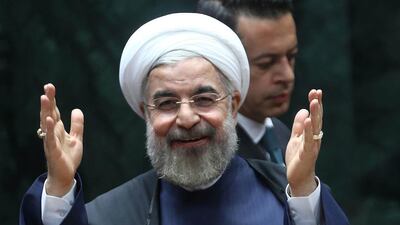ABU DHABI // Most Arabs in the UAE have a poor image of Iran, according to a poll presented at last month’s Sir Bani Yas forum in Abu Dhabi.
The annual forum, organised by the Ministry of Foreign Affairs and the Centre for Strategic and International Studies, gathered foreign ministers from around the world with policy-makers and the UAE Cabinet.
The fifth forum focused on the crisis in Iraq and Syria, the role of Islamist movements, the changing political and security landscape in North Africa, the Middle East Peace Process and the role of Iran in the Middle East, during which the survey was presented.
The poll, which randomly surveyed 7,567 Arabic-speaking adults in Saudi Arabia, Lebanon, the UAE, Jordan, Egypt, Iraq and Turkey, asked whether Iran played a positive or negative role in Lebanon, Syria, Iraq, Bahrain and Yemen. Negative ratings averaged 52 per cent for respondents in the UAE.
It was conducted by US-based Zogby Research.
“Iran lost of a lot of its soft power because of the sectarian tensions and polarisation in the region,” said Dr Albadr Alshateri, adjunct professor at the National Defence College and researcher at the Armed Forces. “Iran, once viewed by the public as an axis of resistance, is now increasingly perceived as a sectarian power because of its intervention in Syria and support for the most sectarian elements in Iraq.”
In five of the seven countries surveyed, more than six in 10 respondents did not feel that Iran’s president, Hassan Rouhani, led the country to play a more positive role in the region. This sentiment was shared by the majority of Arabs in the UAE, at 65 per cent.
“Rouhani is yet to prove that he is in control of the situation in Iran,” said Prof Abdulkhaleq Abdulla, political science professor at UAE University. “He is yet to deliver in some of his promises and Iran is still playing a major negative role all over the place, especially in Yemen lately and before that in Syria and Iraq. So while people had high expectations in terms of delivery, Iran is still the same difficult Iran, which is a force of instability in the region. So Rouhani has not yet passed the test.”
When asked in 2012 whether relations between the UAE and Iran were positive, 57 per cent of Arabs in the UAE said they were not. That figure grew to 66 per cent this year.
“Iran still occupies the UAE islands, which is a major problem between both countries,” Prof Abdulla said. “Despite the call to improve relations and resolve this issue, Iran has not yet responded positively. And it also plays a very negative role when it comes to Bahrain. With all the propaganda that comes out of Iran on a daily basis inciting all sorts of sectarian discourse and I think, as a result, the feeling here in the UAE is that we are in solidarity with Bahrain and Saudi. So unless Iran tries to solve once and for all the island issue and stop its interference, the likelihood of this perception getting worse in the future is high.”
Mark Katz, professor of government and politics at the School of Policy, Government and International Affairs at George Mason University in Washington, DC, said there was a growing sense that Iran was determined to provide armed assistance to its Shia allies.
“And that if Iran is seeking a rapprochement with America and the West, it doesn’t appear to be seeking one with the Gulf states,” he said.
When asked whether the UAE should have friendlier relations with Iran, 53 per cent of Arabs in the country said it should not.
“Clearly, the lack of trust among Arabs vis-a-vis Iran is the prime factor,” Dr Alshateri said. “But if Rouhani follows words with actions, like moving on the issue of the three islands, contributing to a peaceful settlement to the Syrian civil strife, stop lending support to, or at least restraining, the Houthis in Yemen, allowing Lebanon to hold its presidential selection, then I think public opinion will change.”
cmalek@thenational.ae

